Altair: Everything Old is New Again
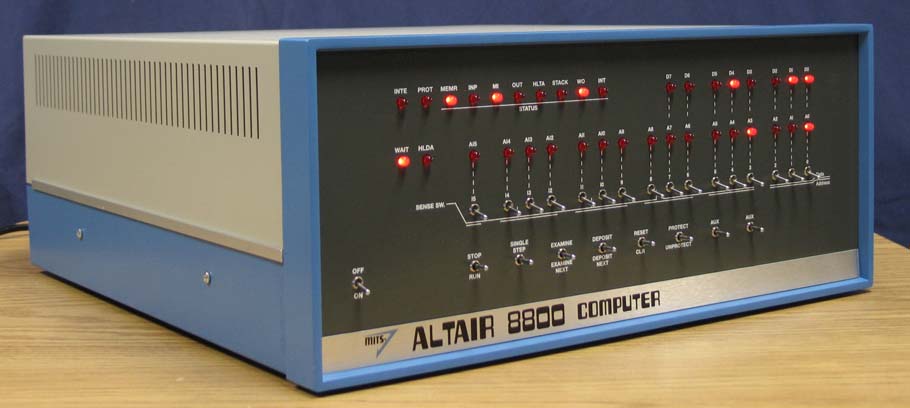
When I was barely a teenager, Popular Electronics ran their famous "Altair" article. I had just started learning about computers and I was mesmerized. The idea that you might be able to buy a computer and have it in your home just boggled my mind. I don't know what I thought I'd do with it, but I wanted one.
The problem was they were about $400 and even that was with little or no memory and certainly not with a terminal or other interface. In those days, $400 might as well have been a million to me. So I drooled over the Altair catalog (which I still have) and read every Popular Electronics article.
I'd eventually go on to build an 1802 (and I've written about that before). But I've always wanted an Altair.
I guess I'm not the only one. Someone is now producing pretty
authentic Altair kits. The PCBs are a little more modern, but the ICs are original period ICs. So far, the only ones available are on eBay, but the Web site promises to actually sell them soon. Pricing is "probably" less than $1700. Hmm... I still can't afford an Altair. I wonder what my wife would tell me if I spent $1700 on "another computer" -- and one that doesn't do anything she'd appreciate at that!
But I know how hard it is to put a kit on the market, and that's a big kit with hard to find parts. So I don't blame the vendor for the price tag. If I were single (or if I wanted to be single again), I'd buy one in a flash.
Labels: old computer
Submit to:
 Del.icio.us |
Del.icio.us |
 Digg |
Digg |
 Slashdot |
Slashdot |
 Diigo
Diigo
History: PDP-1
Many of us used the old DEC PDP-series of computers. You could easily argue that these computers blazed the trail for the idea that a computer could "belong" to someone who would use it themselves and not be shared across a company with an army of acolytes to feed and service it.
But not many of us worked on the first PDP computers (I certainly didn't) and it is interesting to see how far those little computers came over the years.
The Computer History Museum has a great online exhibit:
http://www.computerhistory.org/pdp-1/index.phpOf course, with an FPGA you can build your own PDP computer:
http://www.aracnet.com/~healyzh/pdp_fpga.htmlThe PDP-8, maybe the most important member of the PDP family originally had 8 instructions! You can run a real one (not a simulation) at:
http://www.pdp8.net/run.shtmlLabels: old computer
Submit to:
 Del.icio.us |
Del.icio.us |
 Digg |
Digg |
 Slashdot |
Slashdot |
 Diigo
Diigo
RCA COSMAC ELF 1802 Articles
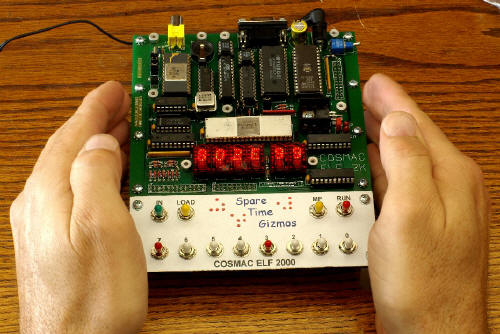
When I was in high school I built an 1802-based ELF, which I had a lot of fun with. It languished in a shed I had in south Mississippi. Every time we'd visit, I'd promise to go find the ELF and get it working again. Then last year Katrina struck and wiped out my little shed.
I did find the poor little computer, but it was seriously destroyed. Luckily, I found
Spare Time Gizmos selling a kit and I bought it. Honestly, I thought I didn't have time to build it so I'd put it on the shelf until I did. But dog gone it, once it came it I had to put it together right away. It's a great kit.
There's actually a thriving community of 1802 people on the Web. Mike Riley has his RCASM assembler, and there's a lot of other software floating around. To do my bit, I put three new articles in the
Articles section. One covers how to change RCASM to recognize erroneous short branches. The second shows how to use minicom under Linux to download to the board. The third article is a link to my 1802 disassembler software I wrote.
Oddly enough, the first articles I ever wrote were for a little "magazine" called QuestData that was published by Quest who made an ELF clone in those days. I'd have never dreamed I'd go on to write for Dr. Dobb's Journal, Web Techniques, and a host of other "real" magazines. Of course, those first articles were terrible -- pains me to read them now -- but you have to start somewhere!
Labels: 1802, article, old computer
Submit to:
 Del.icio.us |
Del.icio.us |
 Digg |
Digg |
 Slashdot |
Slashdot |
 Diigo
Diigo
Musings on Old Computers and Flexowriters
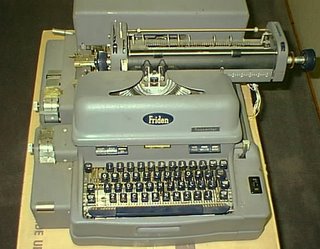
I was reading
this post the other day and it made me think of the various computers I've owned. A homebrew COSMAC Elf (1802), a TRS-80 model 3, a Data General Nova 1200 Jumbo (yes, I had it my garage for years), and a slew of PCs and other lesser computers.
Makes me a little sad, however. My kids will simply recall which PCs they owned. I don't think any of my kids have any recollection of anything less than a Pentium! While PCs today are very exciting, I can't help but wonder if most of the upcoming generation will never know the thrill of interfacing a
Friden Flexowriter to a computer (yes, I had one of those too).
I once spent some time wandering in a mall and saw a booth offering "computerized handwriting analysis." The box was full of blinking lights and there was a slot with some buttons underneath but no keyboard or screen (this was back in the late 70s, so the general public wouldn't find that odd). Upon receipt of a dollar, the man would take a slip of paper that you'd written on, fit it to the slot, push a button and you'd hear mechanical clacking as the machine sucked up the paper. When the paper emerged again, it had some "fortune cookie" saying on it.
I kept studying the machine from a distance, certain it looked familiar. Suddenly it hit me. The machine was a hood covering a Flexowriter! Beneath the hood was an endless loop of paper tape with a few "cookies" surrounded by line feeds and ending with a stop code. So when you put the paper in and pressed "read tape" the platen would turn, a message would print and the paper would eject out the other side until the stop code was read at which point the tape was positioned for the next victim--um, customer.
Those days, I suppose, are long gone.
Labels: old computer
Submit to:
 Del.icio.us |
Del.icio.us |
 Digg |
Digg |
 Slashdot |
Slashdot |
 Diigo
Diigo
Relay Computer
IBM 360 -- Free to Good Homes
Ever wanted to try programming an IBM 360? Well now your little PC can simulate big iron. The simulator, Hercules, will run MVS which is apparently freely available, or it can run other mainframe software that you have licenses for. There is a pretty active user community, and the emulator's support is broad enough that it looks like you can do real work on it. I doubt your PC will keep up with the latest multiprocessor 3090, but it is faster than your typical 70's era 360 (although maybe not as much available DASD -- maybe).
Check it out at
http://www.bsp-gmbh.com/turnkey/Labels: old computer
Submit to:
 Del.icio.us |
Del.icio.us |
 Digg |
Digg |
 Slashdot |
Slashdot |
 Diigo
Diigo
Apollo Project
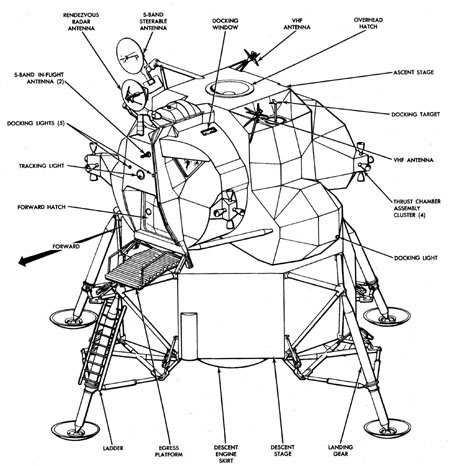
I often wonder if big projects have become harder to run in the modern world. Surely, I always think, the Apollo project didn't have all these problems and issues that we face every day. Apparently not.
http://www.doneyles.com/LM/Tales.htmlLabels: old computer
Submit to:
 Del.icio.us |
Del.icio.us |
 Digg |
Digg |
 Slashdot |
Slashdot |
 Diigo
Diigo
A Square Root the Hard Way
Ever wonder how simple computers compued square roots? Sure you can do the Newton approximation, but for some old computers even that would be hard to code.
Now thanks to
http://www4.wittenberg.edu/academics/mathcomp/bjsdir/ENIACSquareRoot.htm you can read how the Einac computed 2 times the square root of a number using just a few simple types of calculations.
Makes you appreciate a modern computer.
Labels: old computer
Submit to:
 Del.icio.us |
Del.icio.us |
 Digg |
Digg |
 Slashdot |
Slashdot |
 Diigo
Diigo
Old School Computer
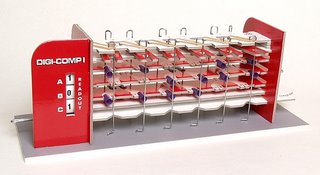
I have a thing for the old computers of my youth. In fact, I just built a new RCA 1802 computer to replace the one I built as a kid (which was lost in hurricane Katrina). If you are old enough, you might remember that there were serveral "computer" kits for kids back in the 60s and 70s. These weren't really computers, but some sort of mechanical or electromechanical logic demonstrators.
The Digicomp was one of the more sophistcated of these, implementing registered logic (that is, flip flops). It was practically a small mechanical CPLD. Someone is actually making these again! I think I'll ask someone to get me one for my birthday.
Check out
http://www.mindsontoys.com/kits.htm?dc1_main.htm.
If you don't want to build one, you can play with a virtual one at
http://www.scoopsfolks.com/digicomp1/. I noticed the full adder isn't right -- not sure if that's from the "program" or a bug in the emulator.
Labels: old computer
Submit to:
 Del.icio.us |
Del.icio.us |
 Digg |
Digg |
 Slashdot |
Slashdot |
 Diigo
Diigo
 When I was barely a teenager, Popular Electronics ran their famous "Altair" article. I had just started learning about computers and I was mesmerized. The idea that you might be able to buy a computer and have it in your home just boggled my mind. I don't know what I thought I'd do with it, but I wanted one.
When I was barely a teenager, Popular Electronics ran their famous "Altair" article. I had just started learning about computers and I was mesmerized. The idea that you might be able to buy a computer and have it in your home just boggled my mind. I don't know what I thought I'd do with it, but I wanted one. Del.icio.us |
Del.icio.us |
 Digg |
Digg |
Slashdot |
 Diigo
Diigo


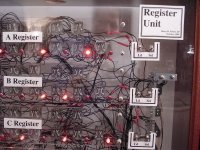



 RSS Feed
RSS Feed